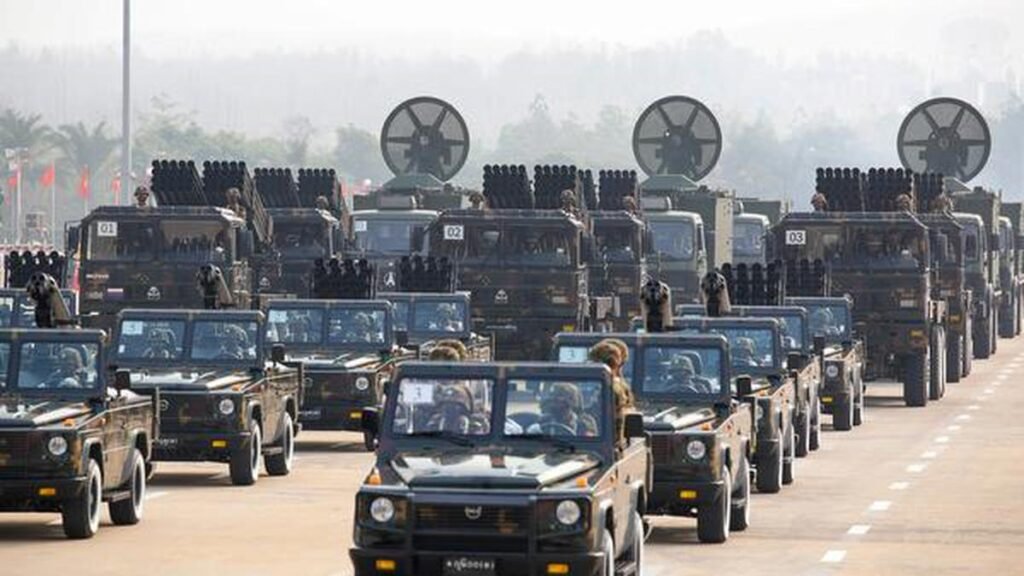In February 1, 2021, when the Army seized control from Myanmar’s elected government, it seemed like an effortless victory that could solidify the military’s authority indefinitely. Fast forward three years, and a modestly equipped grassroots resistance has emerged, challenging the military’s dominance in a contemporary tale reminiscent of David and Goliath.
Amidst the global spotlight on conflicts like those in Ukraine and Gaza, the violence carried out by the military regime in Myanmar has surged, albeit often overlooked.
A surge in airstrikes targeting villages has been reported, resulting in a rise in civilian casualties, as documented by the Armed Conflict Location & Event Data Project, a non-profit organization based in the United States, and Myanmar Witness, headquartered in Britain. The ongoing conflict has precipitated a humanitarian emergency, as highlighted by the UN special rapporteur on Myanmar’s human rights situation in a recent interview.
The seizure of power by the military in Myanmar on February 1, 2021, seemed like an effortless takeover, suggesting a prolonged reign for the armed forces. However, three years later, a resilient grassroots resistance has emerged, challenging the military’s dominance in a contemporary David vs. Goliath struggle.
Despite being overshadowed by global conflicts such as those in Ukraine and Gaza, the brutality inflicted by the military regime has escalated. Reports from organizations like the Armed Conflict Location & Event Data Project and Myanmar Witness reveal a surge in airstrikes on villages and a rising toll of civilian casualties, contributing to a deepening humanitarian crisis. The UN special rapporteur on Myanmar’s human rights situation, Tom Andrews, highlighted the alarming statistics: thousands killed, 2.3 million displaced, and 18.6 million in urgent need of humanitarian assistance. Additionally, widespread poverty, a crippled education system depriving millions of children, and a crumbling healthcare system exacerbate the country’s woes.
Within Myanmar, opponents of military rule have organized a “silent strike” on the anniversary of the coup, urging people to demonstrate solidarity by remaining indoors, mirroring previous commemorations.
In response to the ongoing violence, eight nations, including the U.S., and the European Union have issued a joint statement demanding the cessation of violence against civilians, the release of political prisoners such as Aung San Suu Kyi, and unfettered access for humanitarian organizations, along with inclusive dialogue among all parties involved.
The U.S. has further tightened the screws by imposing fresh sanctions on two companies and four individuals, whom it alleges are funneling funds to the military. These measures, particularly those targeting the supply of aviation fuel crucial for the military’s airstrikes, enjoy robust backing from opposition activists.
Civil disobedience
Following the 2021 military coup, Myanmar witnessed a surge in non-violent protests and civil disobedience. However, the situation escalated into violence as security forces resorted to lethal tactics against demonstrators.
The resistance movement comprises diverse groups united in their steadfast opposition to military rule. Despite lacking centralized coordination, these groups operate independently, driven by a shared goal of restoring democracy. In response to the coup, an opposition National Unity Government emerged, comprising elected lawmakers who were denied their seats by the military. Asserting itself as Myanmar’s legitimate government, it has endeavored to establish a presence across the nation, garnering significant support.
The loosely structured armed wing of the opposition, known as the Peoples Defence Force, primarily operates within their local communities.
The resistance’s strength is bolstered by alliances with armed ethnic minority organizations that have historically advocated for greater autonomy from the central government. These groups offer crucial support through the provision of weapons, training, and refuge for pro-democracy fighters, occasionally engaging in collaborative operations.
Surprise offensive
The Three Brotherhood Alliance, consisting of the Myanmar National Democratic Alliance Army, the Arakan Army, and the Ta’ang National Liberation Army, executed a surprise offensive last October, seizing control of towns, military bases, and garrisons along the Chinese border. This operation proved highly successful, inspiring resistance forces in other parts of Myanmar to initiate their own attacks.
The recent progress on the battlefield has uplifted the prospects of the resistance forces and signifies a significant juncture. However, experts caution that victory for the opposition remains elusive at this stage.
“In an interview, Richard Horsey, a Crisis Group adviser on Myanmar, highlighted a pivotal moment of weakness within the Myanmar military. This vulnerability has emboldened adversaries, leading to a surge in clashes and military actions by resistance forces across the country over the past three months.”
The Assistance Association for Political Prisoners has documented at least 4,474 fatalities caused by security forces since the coup. However, these figures mainly account for deaths in non-combat zones and do not encompass casualties in remote rural areas, where the toll is presumed to be considerably greater. Mr. Horsey emphasized the unpredictability of future events, suggesting that even forecasting three months ahead is challenging.
“I believe we can assert with a reasonable degree of certainty that the civilian populace, the ordinary citizens, will persist in bearing a substantial burden due to the Army’s assumption of power,” he stated. “The economy is in dire straits, with employment opportunities dwindling. Massive displacement and pressing humanitarian needs are prevalent throughout the nation, and unfortunately, these challenges are anticipated to escalate.”
“At this juncture, the downfall of the junta is not guaranteed,” he remarked. “They find themselves in a precarious position, with limited options. Understanding that their only recourse is to persist in battle, they will likely exhibit unwavering determination due to the consequences of failure.”
